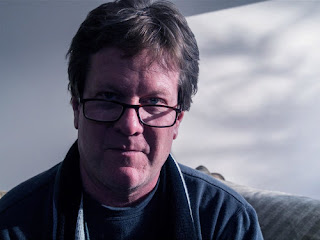ICO's French accent is keyed to Aikman's four-saxophone concerto
A concert program two years in the making, pandemic-delayed like so many things since March 2020, came to fruition this weekend: "Quelle bénédiction!" I might say, unaccustomed as I am to speaking French.
 |
| James Aikman has a long history with the ICO. |
What a blessing, indeed, to welcome James Aikman's "ALARM!" into the slim repertory of concertos for four soloists and orchestra. The Indianapolis Chamber Orchestra commissioned the work from its composer-in-residence of several years' standing.
The PRISM Quartet, which leads the field of contemporary saxophone ensembles, received the work and handled its premiere expertly Saturday night at the Schrott Center for the Arts. (For the performance, Otis Murphy of Indiana University replaced tenor saxophonist Matthew Levy.)
ICO music director Matthew Kraemer fashioned an otherwise all-French program to honor the position of the saxophone in classical music, largely thanks to French composers' interest in the instrument since its invention in the mid-19th century.
As for the new work, its upper-case title may lead to expectations of overstatement and unrelieved edginess. Fortunately, other notes are sounded, too. The composer's remarks about the work in advance interviews emphasize his anxiety as he worked on the composition in the fall of 2019, as if he foresaw the way the world would blow up with the onset of Covid-19 in March 2020. He also declared his admiration for the saxophone across the musical spectrum, and expressed some wonder that it has not been included regularly in the orchestration of new classical music.
Thus, the piece opens with a pattern of steady, loud stabs led by the quartet. But the blending possibilities of solo group and orchestra are quickly embraced. The alarm allusions are immediate, similar to car alarms or building burglar alarms. Amid the gathering tumult is a steady tattoo of urgency from a couple of mallet percussionists; a third one on the other side of the stage picks up the pattern as one of the percussionists moves to the bass drum. The overall intensity builds, and at the premiere PRISM displayed its well-honed balance and tonal security. (Allow me to note that all-caps style on words that aren't acronyms or initialisms makes me queasy, but I yield to how the quartet fashions its name as well as to Aikman's title shout.)
There are some deft changes of texture: solo cadenzas for the soprano, then the baritone, saxophones, and later a duet for the other two solo instruments set against a resumption of orchestra activity. A charming motif develops — four notes up (repeated), three down — and is treated adroitly. Eventually its guardedly hopeful manner is counterpointed against that "alarm" pattern as the work achieves a satisfying resolution. Worth the wait, all told.
The concert's other major work was Francis Poulenc's "Sinfonietta" — four appealing movements that reminded me of the stature long-form music can assume even when it totally ignores any search for profundity. I feel grateful for having attended two concerts in a row (the Indianapolis Symphony Orchestra's "Greetings from Latin America" was the other) without any representation of the Central Europe tradition, as much as I love it. Austro-German gravitas, take a break.
The ICO winds were in especially fine fettle, and the hall continues to flatter the chamber-orchestra sound. The Schrott and the ICO seem made for each other. The acoustics enhance well-defined edges and velvet plush alike. The Haydnesque orchestra that Kraemer noted in remarks before the concert got confirmation in the opportunity Poulenc again takes to express his lively sense of humor; the first and fourth movements came through with an extra measure of wit.
The concert opened with Kenneth Hesketh's orchestration of a set of piano miniatures by Henri Dutilleux (1916-2013). The contemporary British composer studied with Dutilleux, and the six movements of "Au gré des ondes" are fully sympathetic to the slowly emergent modernism Dutilleux was to embrace after his own fashion. He never succumbed to the high modernist orthodoxy, which may have hurt his career. A distinctive personality shows up in this early work, and the way tone colors and rhythmic variety shift around the ensemble was smoothly presented in Saturday's performance.
A brief piece of lyrical sheen and a certain transcendental quality made a nice palate cleanser between the Aikman premiere and "Sinfonietta." Henri Duparc's "Aux etoiles" reached back furthest of anything on the program, as it breathes the atmosphere of French romanticism before the Debussyan revolution. Duparc is mostly well-known for his songs; his music would be a lot more familiar if song recitals weren't so rare nowadays.
Like every other piece on the program, it was well-chosen both for its own sake and for its position in the concert. Moreover, in translation, the title gave the concert its marketable title: "PRISM to the stars."
Quelle bénédiction!



Reading your critique, I feel as if I were there. Now I want to hear these performances.
ReplyDeleteThis is what I always hope to provide for music-lovers who miss the performance under review. Thanks for your comment.
DeleteThank you for covering new music !
ReplyDeleteIt's exciting to do this. Thank you for noticing.
Delete